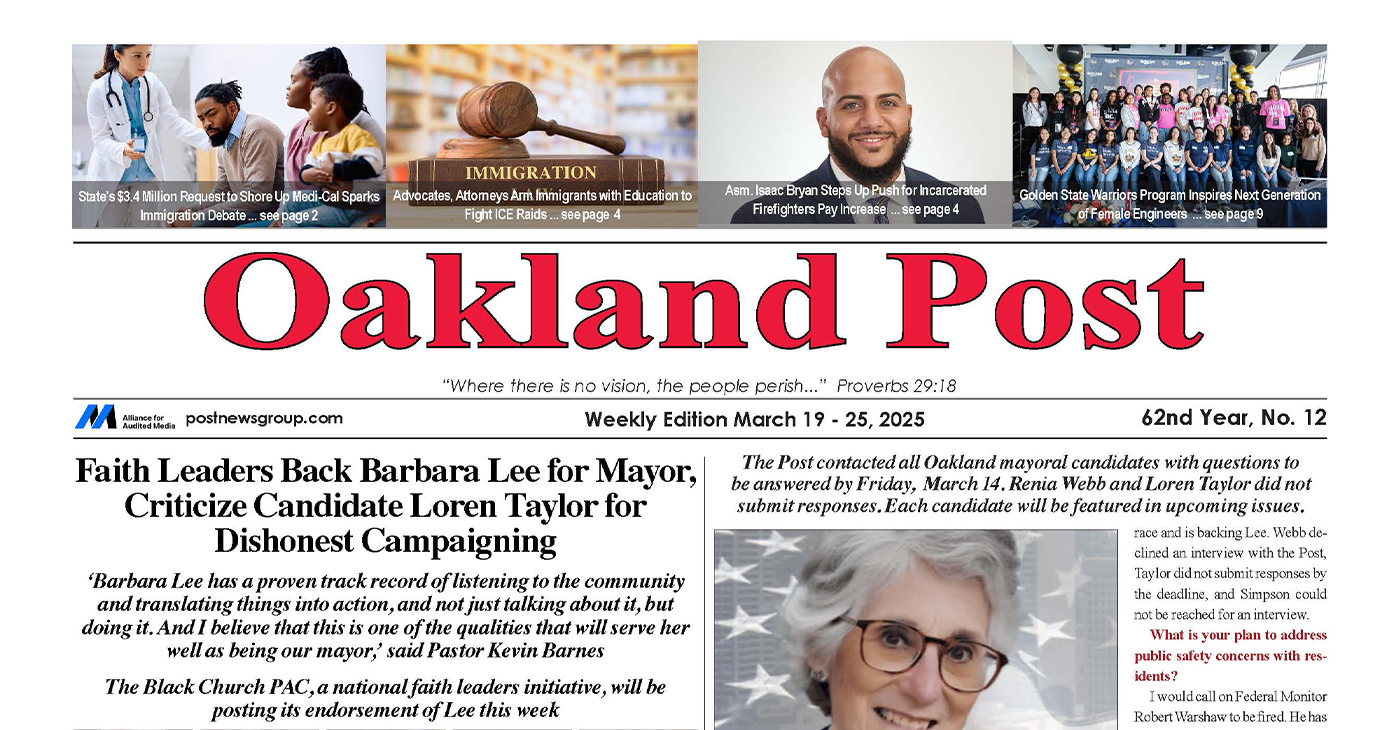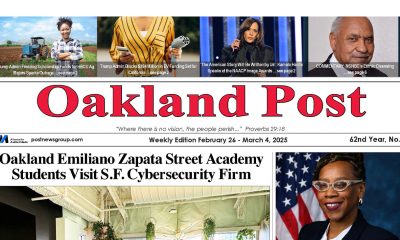Featured
10,000 Eligible for Release Under Sentencing Reform Initiative Prop 47
By Post Staff and news reports
California approved a major shift against mass incarceration on Tuesday in a vote that could lead to the release of thousands of state prisoners.
Under ballot measure Prop. 47, nonviolent felonies like shoplifting and drug possession will be downgraded to misdemeanors. As many as 10,000 people could be eligible for early release from state prisons, and it’s expected that courts will annually dispense around 40,000 fewer felony convictions.
The state Legislative Analyst’s Office estimates that the new measure will save hundreds of millions of dollars on prisons. That money is to be redirected to education, mental health and addiction services – an approach that reform advocates hope will serve as a model in the larger push against mass incarceration.
Prop 47 received 58.5 support of state voters. This big margin of victory should further propel reform in some places because it proves that significant numbers of voters are willing to back lessening criminal penalties.
“This is possibly the most important and progressive piece of legislation that we’ve seen to date addressing mass incarceration and the criminalization of people of color, particularly Blacks,” said Rev. Michael McBride, pastor of The Way Christian Center in Berkeley who has advocated against mass incarceration for the past 15 years.
He adds that this new legislation “reminds us of this very important Christian principle that no one should be defined by the worst thing they’ve done in their life.”
McBride, the Director of Urban Strategies and the Live Free Campaign with PICO, says this victory also teaches a lesson to politicians that are courting the Black vote.
“This demonstrated that we show up when it is something that accesses our misery and our own pain. It’s a lesson to every political party and leader who seeks to have the Black vote,” he said.
“When elections and laws and candidates appeal to very concrete concerns of our community, we turn out to vote and we’ll engage very powerfully in the electoral process.”
Activism
Oakland Post: Week of March 19 – 25, 2025
The printed Weekly Edition of the Oakland Post: Week of March 19 – 25, 2025

To enlarge your view of this issue, use the slider, magnifying glass icon or full page icon in the lower right corner of the browser window.
#NNPA BlackPress
Recently Approved Budget Plan Favors Wealthy, Slashes Aid to Low-Income Americans
BLACKPRESSUSA NEWSWIRE — The most significant benefits would flow to the highest earners while millions of low-income families face cuts
By Stacy M. Brown
BlackPressUSA.com Senior National Correspondent
The new budget framework approved by Congress may result in sweeping changes to the federal safety net and tax code. The most significant benefits would flow to the highest earners while millions of low-income families face cuts. A new analysis from Yale University’s Budget Lab shows the proposals in the House’s Fiscal Year 2025 Budget Resolution would lead to a drop in after-tax-and-transfer income for the poorest households while significantly boosting revenue for the wealthiest Americans. Last month, Congress passed its Concurrent Budget Resolution for Fiscal Year 2025 (H. Con. Res. 14), setting revenue and spending targets for the next decade. The resolution outlines $1.5 trillion in gross spending cuts and $4.5 trillion in tax reductions between FY2025 and FY2034, along with $500 billion in unspecified deficit reduction.
Congressional Committees have now been instructed to identify policy changes that align with these goals. Three of the most impactful committees—Agriculture, Energy and Commerce, and Ways and Means—have been tasked with proposing major changes. The Agriculture Committee is charged with finding $230 billion in savings, likely through changes to the Supplemental Nutrition Assistance Program (SNAP), also known as food stamps. Energy and Commerce must deliver $880 billion in savings, likely through Medicaid reductions. Meanwhile, the Ways and Means Committee must craft tax changes totaling no more than $4.5 trillion in new deficits, most likely through extending provisions of the 2017 Tax Cuts and Jobs Act. Although the resolution does not specify precise changes, reports suggest lawmakers are eyeing steep cuts to SNAP and Medicaid benefits while seeking to make permanent tax provisions that primarily benefit high-income individuals and corporations.
To examine the potential real-world impact, Yale’s Budget Lab modeled four policy changes that align with the resolution’s goals:
- A 30 percent across-the-board cut in SNAP funding.
- A 15 percent cut in Medicaid funding.
- Permanent extension of the individual and estate tax cuts from the 2017 Tax Cuts and Jobs Act.
- Permanent extension of business tax provisions including 100% bonus depreciation, expense of R&D, and relaxed limits on interest deductions.
Yale researchers determined that the combined effect of these policies would reduce the after-tax-and-transfer income of the bottom 20 percent of earners by 5 percent in the calendar year 2026. Households in the middle would see a modest 0.6 percent gain. However, the top five percent of earners would experience a 3 percent increase in their after-tax-and-transfer income.
Moreover, the analysis concluded that more than 100 percent of the net fiscal benefit from these changes would go to households in the top 20 percent of the income distribution. This happens because lower-income groups would lose more in government benefits than they would gain from any tax cuts. At the same time, high-income households would enjoy significant tax reductions with little or no loss in benefits.
“These results indicate a shift in resources away from low-income tax units toward those with higher incomes,” the Budget Lab report states. “In particular, making the TCJA provisions permanent for high earners while reducing spending on SNAP and Medicaid leads to a regressive overall effect.” The report notes that policymakers have floated a range of options to reduce SNAP and Medicaid outlays, such as lowering per-beneficiary benefits or tightening eligibility rules. While the Budget Lab did not assess each proposal individually, the modeling assumes legislation consistent with the resolution’s instructions. “The burden of deficit reduction would fall largely on those least able to bear it,” the report concluded.
#NNPA BlackPress
A Threat to Pre-emptive Pardons
BLACKPRESSUSA NEWSWIRE — it was a possibility that the preemptive pardons would not happen because of the complicated nature of that never-before-enacted process.

By April Ryan
President Trump is working to undo the traditional presidential pardon powers by questioning the Biden administration’s pre-emptive pardons issued just days before January 20, 2025. President Trump is seeking retribution against the January 6th House Select Committee. The Trump Justice Department has been tasked to find loopholes to overturn the pardons that could lead to legal battles for the Republican and Democratic nine-member committee. Legal scholars and those closely familiar with the pardon process worked with the Biden administration to ensure the preemptive pardons would stand against any retaliatory knocks from the incoming Trump administration. A source close to the Biden administration’s pardons said, in January 2025, “I think pardons are all valid. The power is unreviewable by the courts.”
However, today that same source had a different statement on the nuances of the new Trump pardon attack. That attack places questions about Biden’s use of an autopen for the pardons. The Trump argument is that Biden did not know who was pardoned as he did not sign the documents. Instead, the pardons were allegedly signed by an autopen. The same source close to the pardon issue said this week, “unless he [Trump] can prove Biden didn’t know what was being done in his name. All of this is in uncharted territory. “ Meanwhile, an autopen is used to make automatic or remote signatures. It has been used for decades by public figures and celebrities.
Months before the Biden pardon announcement, those in the Biden White House Counsel’s Office, staff, and the Justice Department were conferring tirelessly around the clock on who to pardon and how. The concern for the preemptive pardons was how to make them irrevocable in an unprecedented process. At one point in the lead-up to the preemptive pardon releases, it was a possibility that the preemptive pardons would not happen because of the complicated nature of that never-before-enacted process. President Trump began the threat of an investigation for the January 6th Select Committee during the Hill proceedings. Trump has threatened members with investigation or jail.
-

 #NNPA BlackPress3 weeks ago
#NNPA BlackPress3 weeks agoTarget Takes a Hit: $12.4 Billion Wiped Out as Boycotts Grow
-

 Activism3 weeks ago
Activism3 weeks agoUndocumented Workers Are Struggling to Feed Themselves. Slashed Budgets and New Immigration Policies Bring Fresh Challenges
-

 #NNPA BlackPress3 weeks ago
#NNPA BlackPress3 weeks agoBREAKING Groundbreaking Singer Angie Stone Dies in Car Accident at 63
-

 #NNPA BlackPress3 weeks ago
#NNPA BlackPress3 weeks agoApple Shareholders Reject Effort to Dismantle DEI Initiatives, Approve $500 Billion U.S. Investment Plan
-

 #NNPA BlackPress3 weeks ago
#NNPA BlackPress3 weeks agoNAACP Legend and Freedom Fighter Hazel Dukes Passes
-

 Activism3 weeks ago
Activism3 weeks agoOakland Post: Week of February 26 – March 4, 2025
-

 #NNPA BlackPress3 weeks ago
#NNPA BlackPress3 weeks agoSeniors Beware: O’Malley Says Trump-Musk Cuts Will Cripple Social Security
-

 #NNPA BlackPress3 weeks ago
#NNPA BlackPress3 weeks agoTrump Kicks the Ukrainian President Out of the White House




















































